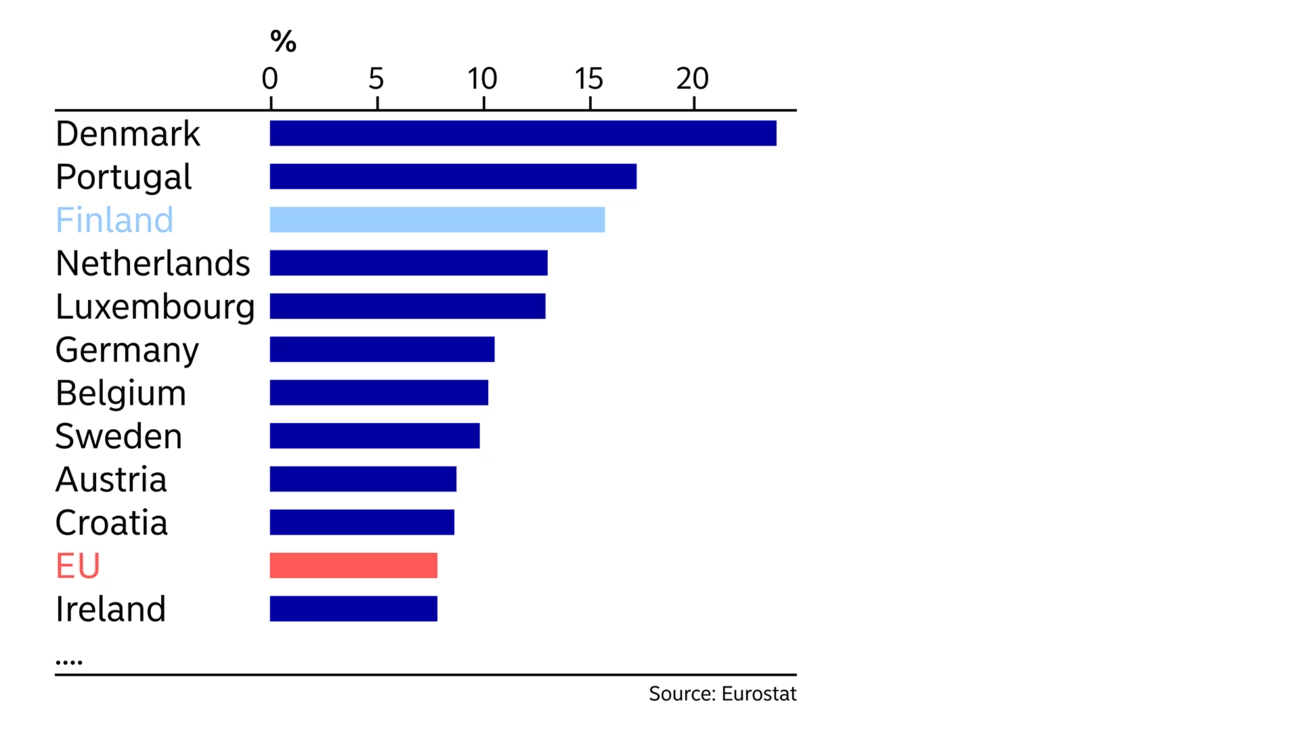
- Name:
- Juho Kostiainen
- Title:
- Nordea Senior Analyst
Initial research suggests that using artificial intelligence can significantly improve productivity. Due to its high digital readiness, Finland is in a good position to leverage AI. After all, AI creates an opportunity for Finnish companies to get back on the productivity growth track.

Initial research suggests that using artificial intelligence can significantly improve productivity in various types of knowledge work. Based on these studies, employees with a lower level of knowledge would benefit the most from using AI. With the adoption of AI, quality of work and employee satisfaction often seem to increase, too.
A study on people who work as call centre agents revealed that the agents using AI resolved 14% more issues per hour on average (Brynjolfsson, E., et al. 2023). Less experienced workers gained the most from using AI, as their productivity increased by 34%, while the most experienced workers had very little to gain. What these results show is that AI can help capture the knowledge that already exists among the workers.
In another study, consultants were able to perform their tasks 25% faster with the help of AI (Dell’Acqua, F. 2023). However, AI did not prove to be beneficial in all of the 18 tasks the consultants were asked to perform. In some of the tasks the use of AI, in fact, increased the number of incorrect responses.
Studies investigating the impact of AI tools on software development (Pent et al. 2023) and on the examination of X-ray images (Gaube et al. 2023) also displayed significant improvements in productivity.
This shows that AI can be used for a wide variety of tasks. The best results are achieved by combining human input and AI, allowing AI to supplement human work and boost productivity. AI would therefore seem to elevate human work rather than replace it entirely.
Workers with a higher education and higher income are more exposed to the effects of AI. According to a study by ETLA Economic Research (Kauhanen, A. et al. 2023), one in five Finns have occupations in which at least 50% of their tasks are exposed to AI. Two-thirds of Finnish workers can use AI in 20% of their tasks.
AI is evolving in leaps and bounds as a result of increased computing power and major investments in the technology, so it’s difficult to say what it will eventually be capable of. On the other hand, businesses will need time and resources to fully deploy AI, which means that the impact on productivity gains in terms of the entire economy will be seen in the long term.

Artificial intelligence can deliver a long-awaited productivity boost to the Finnish economy.
Finland’s productivity trend has been stagnant for the past 15 years. One of the main reasons has been the decrease in intangible investments, such as investments in R&D in particular.
AI creates an opportunity for Finnish companies to get back on the productivity growth track. Integrating AI into everyday work means that companies need to be willing to invest in it, but it doesn’t necessarily require big advances in AI technology, a field in which major innovations come from the US and China at the moment.
Finland is the highest ranking country in the EU’s Digital Economy and Society Index (DESI). The index tracks areas including digital skills, connectivity, integration of digital technology and digital public services. Other Nordic countries are also top performers in the index.
Due to its high digital readiness, Finland is in an excellent position to take full advantage of AI. Finland ranks third among the EU countries in the integration of artificial intelligence, with more than 15% of Finnish companies currently using AI. The best way to prepare for the AI-driven transformation is to try and implement AI tools as quickly as possible.
This article originally appeared in the Nordea Economic Outlook: Falling into place, published on 24 April 2024. Read more from the latest Nordea Economic Outlook.


Sustainability
Amid geopolitical tensions and fractured global cooperation, Nordic companies are not retreating from their climate ambitions. Our Equities ESG Research team’s annual review shows stronger commitments and measurable progress on emissions reductions.
Read more
Sector insights
As Europe shifts towards strategic autonomy in critical resources, Nordic companies are uniquely positioned to lead. Learn how Nordic companies stand to gain in this new era of managed openness and resource security.
Read more
Open banking
The financial industry is right now in the middle of a paradigm shift as real-time payments become the norm rather than the exception. At the heart of this transformation are banking APIs (application programming interfaces) that enable instant, secure and programmable money movement.
Read more